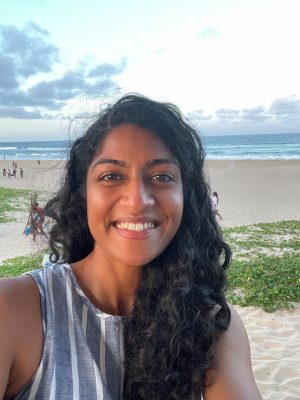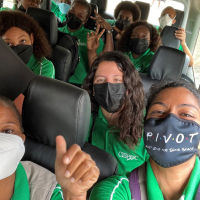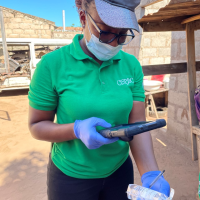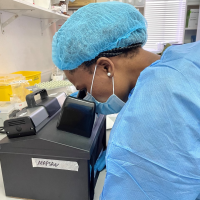Q&A with Gouthami Rao, PhD candidate in Environmental Science and Engineering (ESE)

Gouthami Rao
What was your background before enrolling in the PhD program at Gillings?
Prior to enrolling as a PhD student at Gillings I was originally working with my same advisor, Joe Brown, at Georgia Institute of Technology. I was also working at the Centers for Disease Control and Prevention (CDC) before deciding to move to UNC to pursue my degree full time. My undergraduate degree is a Bachelors of Science (BS) in Environmental Science and my master’s degree in public health (MPH) in Environmental Health, both received from Emory University.
Can you tell us about your PhD program?
The Environmental Science and Engineering (ESE) program is a cohort of like-minded students interested in critically thinking through environmental engineering and public health-related questions, problems, and topics. The program covers a broad range of elective topics from toxicology and water, sanitation, and hygiene policy to air quality methods and spatio-temporal applications. The program also covers a foundation of key environmental engineering and public health courses, depending on your interested track. I’ve found the technical skills learned through the public health lens creates a productive learning environment.
Will you tell us about your work within Dr. Joe Brown’s Lab?
My research in the Brown lab focuses on multiple enteric pathogen detection and quantification methods for environmental matrices, such as wastewater. I used these methods on wastewater influent samples collected during the early phases of the COVID-19 pandemic and currently working on publishing the data. I also had the opportunity to work with the World Health Organization (WHO) on a systematic review for water treatment technologies and microbial log-reduction values for low-resource settings. There has been no shortage of working with amazing collaborators and colleagues through Joe’s lab network.

The CISPOC MapSan Team getting ready for a day of in-field sample collection training
Can you tell us about your current work in Maputo, Mozambique?
My current work in Maputo, Mozambique focuses on enteric pathogen detection and quantification in various environmental matrices such as flies, prepared foods, stored water, floor swabs, soil, fecal sludge, animal waste, and air samples. I am interested in understanding the environmental transmission risks associated with each sample type and the relative risk of enteric infection between our shared sanitation facility intervention and control arms. Our teams at the Centro de Investigação e Treino em Saúde da Polana Caniço (CISPOC) have been trained to collect and process these sample types for the next one year and have been an amazing team to work with.

MapSan enumerator scans a barcode for electronic data capturing of a stored water sample

Lab-team-reads-the-IDEXX-Quanti-Tray-results-for-E.-coli-using-a-black-box-to-house-UV-light
What does “global health” mean to you?
Global Health is the ongoing pursuit of health equity, most often for those in under-served or low-resource settings. There are complex economic, political, religious, and social components that play into the success of global health. The goals towards global health are dynamic and we continue learning as we refine the benchmarks we view as improving health outcomes. Global health is a cross-sectional area of work with policy, science, business, environment and even security. It can be a life-long career as there is no shortage of infectious disease, social, or environmental determinants to understand and identify locally sustainable solutions.
What drew you to the Gillings School of Global Public Health?
The opportunity to continue working with Joe is what drew me to Gillings. I would say 80-90% of your PhD experience is based on your advisor/advisee relationship. If you work well together you tend to produce quality results, projects, and have an overall positive experience. Like many students who weigh their options before making a decision, I considered the opportunities I would have if I stayed at Georgia Tech versus moving to Gillings and in the end I knew following Joe and working with an integrated program focused on public health and engineering would be beneficial in the long-run. Since being at Gillings, I’ve found my cohort and growing lab group to be exceptionally talented (in and outside of the classroom) and largely appreciative of a good work-life balance. And the wonderful nature pockets of North Carolina’s have been a joy to explore.
What is your dream job?
My dream job is ever evolving. While I see a future in the world of academia, I think there are amazing opportunities now available for PhD students that were not as prevalent 10 years ago. For example, government, industry and NGOs all have relevant positions that are created to meet the skill set needed. In short, my dream job is to lead international research on water, sanitation, and hygiene-related topics across public health and engineering spaces; wherever I am allowed to bridge these interests is the best dream job I could ask for.
What was the most challenging trail you ever hiked?
Fantastic question—I fell in love with trekking back in college and the most challenging trail I’ve encountered was Mt. Kenya – Chogoria route. It was a multi-day trek, which started off great, but many couldn’t summit to the top. I was lucky our tour guide was knowledgeable and gave us several tips and tricks to increase our chances to summit. I love the physical and mental challenge of the entire trek and would highly recommend Mt. Kenya to anyone interested!
